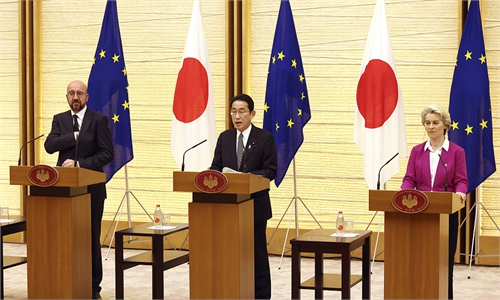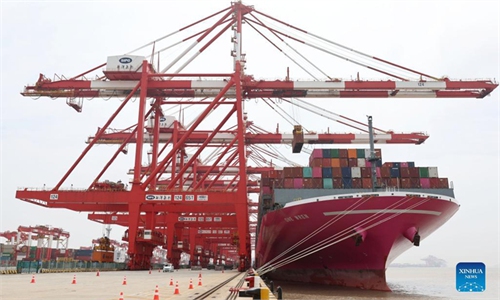
Illustration: Chen Xia/Global Times
The European Union Chamber of Commerce in China (EUCCC) held a media roundtable on China's economic outlook amid COVID-19 on Monday, during which a report was presented to show that the COVID-19 situation is generally in control in China. However, during the online meeting, some EUCCC representatives blasted China's dynamic-zero policy, claiming that a number of economic data shows the policy is "the wrong direction in many ways."
In answering the Global Times' interview, the EUCCC also claimed that European businesses would shun their long-term investment plans for the world's second-largest economy as uncertainty under China's COVID-19 policy "makes everything very difficult." A range of economic headwinds were also highlighted during the meeting, including supply chain disruption, difficulty in cross-city and cross-border travelling, and close-looped management that leads to shortage of workers.
Those negative comments echoed a survey released jointly by the EUCCC and Roland Berger on May 5. Under the dynamic zero-COVID policy, the survey suggested 23 percent of respondents were considering shifting current or planned investments out of China to other markets - more than double the number that were considering doing so at the beginning of 2022, and the highest proportion in a decade.
Some European entrepreneurs may want to ditch China, but this does not represent the whole picture as there are also foreign investors that continue to bet on an economic recovery under the dynamic zero-COVID policy. The latest data released by the Ministry of Commerce on Thursday shows that China's actual use of foreign capital surged by 20.5 percent year-on-year to 478.61 billion yuan ($74.47 billion) in the first four months of the year. This figure proved the short-sightedness of some European entrepreneurs which have apparently misjudged the true state of China's economy. Such short-sightedness will certainly backfire as they will suffer a loss because of their wrong investment decisions.
There is no need to deny that the coronavirus pandemic has impacted the economy in many ways. However, the economic fallout from the pandemic will be only a short-term one. China's economy is highly resilient and has enormous potential. The fundamentals that sustain long-term growth have not, and will not change. We believe that it is based on the country's long-term growth prospects that multinational companies continue to increase their investment in China.
As China is fiercely combating COVID-19 outbreaks, the economic picture has become increasingly complicated. Some see the positive side of the economy, while others focus on the negative side and difficulties. It is understandable that some European investors may express their frustration toward the supply-chain disruption caused by the epidemic, but the more difficulties, the more rational one should be when it comes to viewing the economic headwinds facing China. Overexaggerating of some short-term factors could be misleading for decision makers. Those who can put aside short-term impact and recognize China's long-term economic development potential will benefit from their share of the Chinese market in the future.
As the daily number of new infections continues to drop, Shanghai restarted businesses, services at wholesale markets and manufacturing companies in a phased way on Monday. Also, officials said the Chinese economy may do better in May. Time will prove that dynamic zero-COVID is the most suitable strategy for China to fight the virus and keep its economic overall stable.
EU companies should think about why most multinationals continue to increase their investment in China. They are advised not to miss out on the Chinese market.
The author is a reporter with the Global Times. bizopinion@globaltimes.com.cn


